Convocation: Honorary degrees and emeritus professorships
Convocation: Honorary degrees and emeritus professorships McGill University
User Tools (skip):
Convocation: Honorary degrees and emeritus professorships
David Johnston
Honorary Doctorate of Law
A familiar face returns
There is something wrong with the picture. It's the same familiar figure, the snowy hair, the gap-toothed grin, the soft blue eyes. It's the same familiar navy blue suit. But the tie... The tie is all wrong.
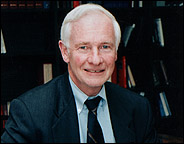 |
|
David Johnston doesn't sport his once trademark McGill tie much these days. It's somewhere in the back of his tie rack, displaced by one bearing the insignia of the University of Waterloo.
He's got a good excuse. He'll always have fond memories of the 20 years he spent at McGill, 15 as the University's principal, but it's at U of W that he earns his salary these days, as the school's president.
He traded in his Westmount digs last year for an Ontario farm where his wife Sharon tends to the 23 horses boarded there.
While Johnston led McGill, the University was starved by government underfunding. McGill's financial difficulties were one of the few things that could rattle the normally gregarious and even-tempered legal scholar.
"I can't tell you how many times I've been awake at 3 a.m. with outrage at our situation just overwhelming me," Johnston declared in 1991.
Still, during his watch, the University held fast to its reputation for quality. When he stepped down as principal, The Gazette wrote, "Today, there is scarcely an academic discipline, no matter how obscure, through which McGill's influence is not felt somewhere on earth. Considerable credit has to go to Mr. Johnston."
During his 15-year stint as McGill's principal, Johnston developed a reputation as the best university fundraiser in the country, with the possible exception of the University of Toronto's Robert Prichard.
He was also well known for his personal touch. "His handwritten notes passing on his appreciation, congratulations, comfort or support are legion," said former McGill Chancellor Gretta Chambers. "His neat and all but indecipherable handwriting became as familiar to the people of McGill as the University crest."
Johnston returns to McGill next week to pick up an honorary doctorate of law.
Waterloo is best known, perhaps, for its pioneering use of co-op education. About 60 per cent of Waterloo students take part in co-op programs involving frequent breaks from coursework in order to do four-month stints in jobs related to their studies. "It's been a very successful educational innovation. Of course, we've been teaching medicine that way for hundreds of years," Johnston rates.
Johnston says co-op experiences don't just offer students hands-on skills, they also reinforce the importance of what students learn in the classroom. "The most practical thing in the world is a good general theory that you can apply to real life."
Johnston has long been rumoured to be a much sought-after political candidate on the federal scene. Asked why he was never lured to Ottawa, he offers a quick reply. "The short answer is I never had the courage.
"I admire the people who run for political office enormously. I have friends who are currently in the government. It takes an enormous amount of courage to give up your profession for the sort of commitment that government requires."
Johnston has stayed close to public policy over the years though, through his involvement with a number of government-mandated task forces. He was recently selected to head a new task force, reporting to the Minister of Industry, that will look into ensuring that every community in Canada has high-speed access to the Internet within three years.
Closer to home, the Ontario government has just opened the doors for private for-profit companies to begin offering university degrees.
"By and large, we welcome the competition," Johnston says of the response of the province's public universities. "Diversity is an important thing." Johnston suspects the new institutions will successfully carve out niche areas, but doubts they will make much of a dent in the existing schools' enrolments. But the public universities agree on one thing. The private institutions should pay their own way.
"Our concern is that for-profit institutions shouldn't receive public funding."
Johnston's return to university leadership has him fighting the battle against university underfunding again.
Johnston says he often tells business leaders that the return on the investment of a dollar in higher education in Canada is unmatched anywhere in North America, "hands-down.
"In no other area do you see institutions offering the same kind of quality and accessibility so cheaply. Good U.S. public universities receive close to two times as much funding as universities in Ontario and Quebec. The top private universities, the Harvards, Princetons and Stanfords, receive close to 10 times the funding. It's a miracle that universities like McGill and Waterloo produce results that rank with the best. But it's not a miracle that we can sustain."
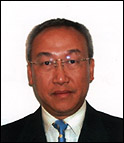 |
|
Milton K.H. Leong
Honorary Doctorate of Sciences
A pioneer in the development of in-vitro fertilization, Dr. Milton Leong's ties with McGill go back three decades. He arrived at McGill as a student, graduating with a BSc in 1966 and MD in 1970. From 1975 to 1979, he returned to his alma mater as coordinator of student teaching for the Department of Obstetrics and Gynaecology, as a specialist in diagnostic ultrasound, assistant obstetrician, gynaecologist and perinatal consultant at the Royal Victoria Hospital, and worked at the Montreal General's high-risk pregnancy unit. By 1980, he had returned to his native Hong Kong, where he worked on infertility treatments and was responsible for the city's first in-vitro fertilized (IVF) baby in 1986. He is now director of the IVF Centre at the Hong Kong Sanatorium and Hospital. Since 1996, he has served as president of the McGill Society of Hong Kong and has been largely responsible for making it one of the most active branches in the world, earning him a Distinguished Service Award from the Alumni Association in 1998. With his wife Susie, who holds a BSc and MSc from McGill, Leong established a McGill endowment for graduate fellowships that promote exchanges between Chinese and McGill students in health sciences. As well, he recently contributed a major gift to establish a chair in reproductive medicine bearing his name in the Department of Obstetrics and Gynaecology.
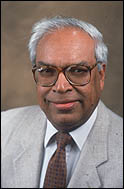 |
|
Rabindra N. Kanungo
Emeritus Professor of Management
Professor Rabindra Kanungo has been a prolific writer during his 31-year teaching career at McGill. He has authored or co-authored a dozen books, over 125 journal articles, and has been guest editor or editorial consultant to several journals across North America. His teaching interests have focused on social psychology in management and organizational leadership, while his current research has examined the effectiveness of advertising, job motivation and work alienation. Kanungo is a Fellow of the Canadian Psychological Association, a recipient of multiple research grants, the 1988 Faculty of Management Chair, a Seagram Senior Research Fellowship and an Award of Excellence winner from the Administrative Sciences Association of Canada.
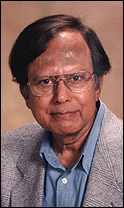 |
|
Barid B. Mukherjee
Emeritus Professor of Biology
Research has always been a major component of Dr. Barid Mukherjee's 37-year career at McGill. From 1966 to 1996, the biology professor and human genetics researcher has received continuous financial support for various studies from the Medical Research Council of Canada and, in latter years, from the March of Dimes Birth Defects Foundation. In his early work, Dr. Mukherjee provided the first evidence that one of two X-chromosomes -- maternal and paternal found in mammalian or human females -- undergoes random genetic inactivation during early embryonic development. In 1973, he redirected his research on RNA tumour viruses or retroviruses. For the last 15 years, he and his research team have examined the molecular biology of a protein called osteopontin, which is secreted by all cancer cells as well as normal cells. On the teaching front, Mukherjee introduced and continues to teach a popular course on the molecular phosphoprotein. From 1985-90 he was chair of his department, and he has supervised the work of several dozen honours or graduate students. He has also authored or co-authored some 80 research papers.
 |
|
Jeanne Mary Wolfe
Emeritus Professor of Urban Planning
After obtaining an MA in community planning from McGill, Jeanne Wolfe worked for the Montreal and Quebec government planning departments for a decade. She joined McGill's School of Urban Planning in 1973 and served as its director from 1989 to 1999. She helped develop courses in the history, theory and practices of planning. She has authored or co-authored over 100 articles, reports or proceedings and has written or co-written a dozen book chapters and four books related to urban planning. Since 1985, she has been committed to researching the urban issues of developing countries, including Belize and Trinidad. Wolfe is a Fellow of the Royal Geographic Society and the Canadian Institute of Planners.
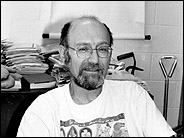 |
|
Martin Julius Zuckermann
William C. Macdonald Emeritus Professor of Physics
During his 31 years at McGill, Martin Zuckermann could easily be called the travelling academic, having been a visiting professor at a dozen universities around the world from Chile to Australia. He was also an active researcher who wrote or co-wrote a whopping 175 academic articles, to date, on subjects that included physics of materials, biophysics, magnetism, the superconductivity in impure and amorphous metals, and the nature of glass transitions. In 1989, Zuckermann helped found the McGill Centre for the Physics of Materials and served as its director until 1999. Zuckermann is a Fellow of the Royal Society of Canada and an International Member of the Royal Danish Academy of Science and Letters.
Darko R. Suvin
Emeritus Professor of English
A Yugoslavian native who arrived at McGill in 1968, Darko Suvin is a pioneer in science fiction studies and an authority on Bertolt Brecht. He has written or co-written several academic essays and edited journals on utopian or science fiction. As well, he is the author of two books, Metamorphoses of Science Fiction and Victorian Science Fiction in the U.K. In 1973, he co-founded the journal Science Fiction Studies and in 1979 won the Science Fiction Research Association's Pilgrim Award. Suvin speaks several languages, including Croatian, French, English, Italian, German and Russian, and he is now learning Japanese. He is a Fellow of the Royal Society of Canada and, in his spare time, a prolific poet.
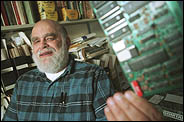 |
|
Michael Barr
Peter Redpath Emeritus Professor of Pure Mathematics
Since joining McGill's Department of Mathematics and Statistics in 1968, Professor Michael Barr has become an internationally recognized algebraist and a pillar of his department. Much of his research has focused on category theory, which originated in response to the needs in the fields of algebra and algebraic topology. Category theory is widely used in several applications, including mathematical logic, theoretical computer science, quantum groups and theoretical physics. Barr has authored or co-authored 60 papers and three research monographs. Before retiring in 1999, Barr was named Peter Redpath Professor of Pure Mathematics in 1998.

